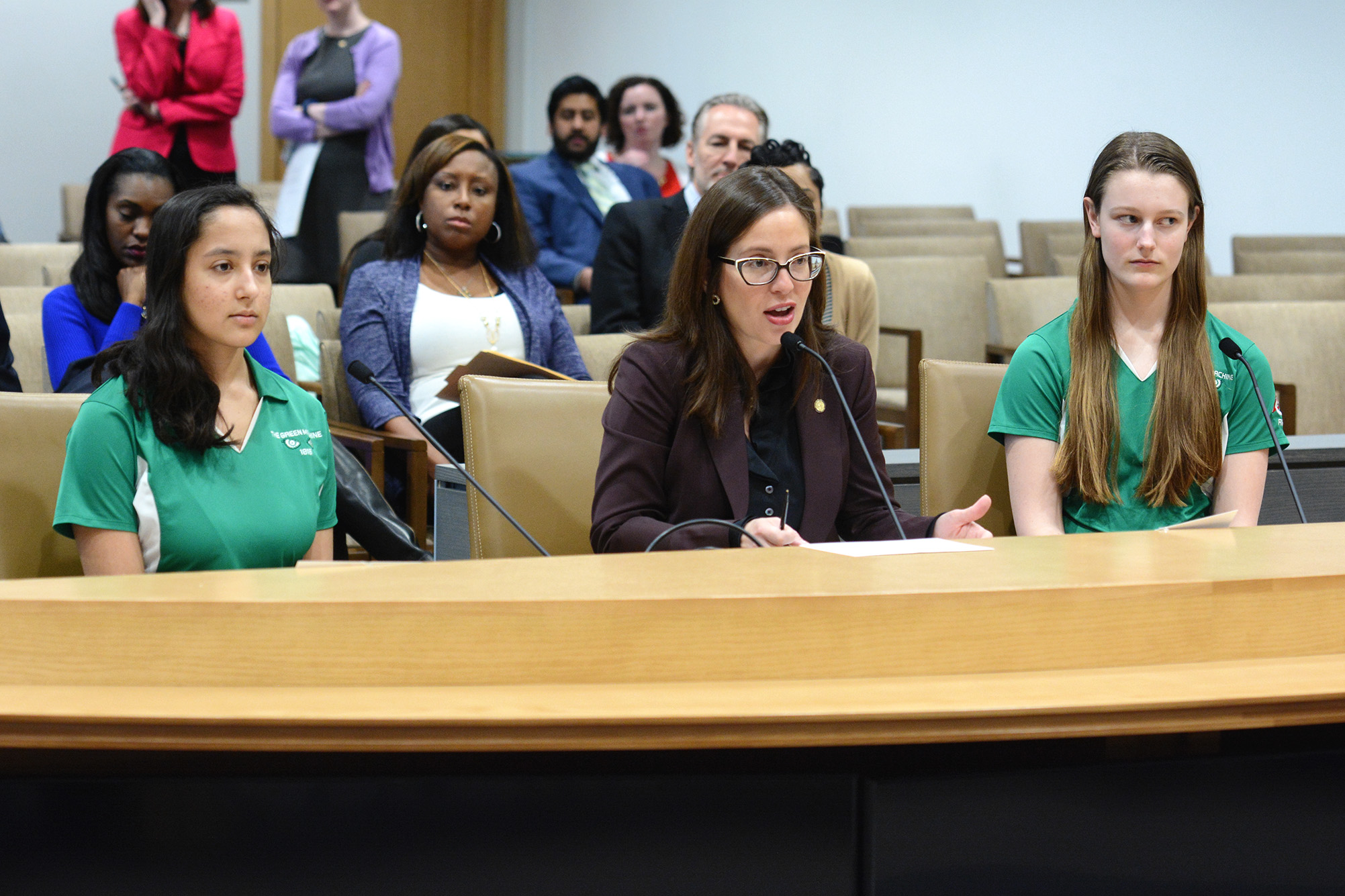A
weekly
message
from
your
Senator
Dear
Constituents
and
Friends,
With
this
week's
announcement
of
the
state's
$1.65
Billion
surplus
the
Senate
finance
committees
will
start
piecing
together
a
budget
for
the
next
biennium
to
fund
schools,
social
services,
infrastructure
and
other
aspects
of
our
government.
It
was
a
productive
week
with
the
Senate
voting
on
several
bills
including
Sunday
liquor
sales,
which
I
supported.
Next
week
we
have
our
first
committee
deadline
so
it
promises
to
be
a
busier
week
for
bills
to
make
it
through
the
legislative
process.
Cheers,
Senator
Melisa
Franzen
Sunday
sales
makes
progress
This
week
the
Senate
passed
legislation
to
allow
liquor
stores
to
be
open
on
Sundays
from
11
a.m.
to
6
p.m.
The
bill
also
prohibits
wholesale
delivery
and
solicitations
or
merchandising
by
wholesalers
on
Sundays.
Many
Senators
heard
from
constituents
that
they
want
the
option
to
purchase
off-sale
liquor
on
Sundays.
The
bill
passed
38
to
28.
The
bill
was
re-passed
by
the
House
as
amended
and
will
be
sent
to
the
Governor
who
has
indicated
he
will
sign
the
bill.
Minnesota
is
currently
one
of
12
states
that
prohibits
the
sale
of
liquor
on
Sundays.
Supporters
of
Sunday
sales
argue
that
the
law
is
outdated
and
limits
the
ability
of
Minnesota
businesses
to
compete
with
neighboring
states
on
the
sale
of
Sunday
spirits.
Sixty
%
of
Minnesotans
live
within
30
miles
of
the
border,
and
supporters
of
the
bill
are
concerned
with
Minnesota
tax
dollars
going
to
neighboring
states.
Opponents
of
the
bill
argue
that
family-owned
and
municipal
liquor
stores
will
not
necessarily
generate
any
more
profits
by
staying
open
on
Sundays.
Rather,
small
stores
will
have
to
compensate
for
the
increase
in
operating
costs
by
raising
prices
and
further
tilting
the
marketplace
in
favor
of
big-box
retailers.
Opponents
also
say
allowing
Sunday
liquor
sales
will
result
in
more
alcohol-related
accidents,
more
substance
abuse
throughout
the
state,
and
will
negatively
affect
the
finances
of
municipal
liquor
stores
in
rural
area
that
depend
on
funds
from
these
stores.
Legislators
have
attempted
to
remove
the
ban
on
Sunday
liquor
sales
over
the
course
of
the
last
several
sessions.
This
year
is
the
first
year
that
the
Legislature
has
heard
the
issue
as
a
stand-alone
bill
rather
than
an
amendment
on
the
Senate
floor.
(HF30)
Moratorium
on
mowing
permits
A
bill
that
places
a
moratorium
on
the
Minnesota
Department
of
Transportation’s
(MnDOT)
authority
to
set
up
a
permitting
process
allowing
farmers
to
mow
and
bale
hay
in
highway
rights-of-way
under
the
department’s
authority
passed
the
Senate
floor
Thursday.
The
moratorium
is
in
effect
until
April
30,
2018.
The
moratorium
is
meant
to
give
stakeholders
time
to
work
out
a
mutually
agreeable
system
for
the
future.
This
issue
has
been
controversial
at
the
Legislature
over
the
past
few
years.
The
issue
gained
new
urgency,
however,
when
late
last
year,
MnDOT
announced
a
new
permitting
system
and
uniform
rules
to
follow.
This
has
led
to
many
farmers
being
upset
with
what
are
seen
as
new
restrictions
on
their
ability
to
mow
and
hay
rights-of-way.
The
law
restrictions
on
the
seasonality
of
mowing
and
baling
have
been
on
the
books
since
the
1980s,
but
the
laws
were
not
being
followed
by
farmers
or
enforced
by
the
department.
(SF
218)
Budget
surplus
announced
The
state
February
Budget
Forecast
was
announced
recently
and
projected
a
$1.65
billion
surplus.
This
forecast
provides
key
information
to
legislators
as
it
will
help
shape
spending
and
tax
decisions
for
the
state's
two-year
budget.
The
prediction
is
$250
million
higher
than
projected
in
November.
House
and
Senate
leadership
are
expected
to
give
budget
targets
to
each
committee
to
use
to
fund
their
priorities.
Governor
Mark
Dayton
will
also
update
his
budget
proposal
in
response
to
the
changes
in
the
forecast.
Federal
STEM
funding
encouraged
for
schools
A
bill
I
authored was
heard
this
past
week
that
encourages
schools
to
utilize
funding
from
the
federal
Every
Student
Succeeds
Act
(ESSA)
for
STEM-related
activities.
The
bill
is
intended
to
motivate
school
districts
to
make
use
of
the
federal
ESSA
Title
IV
funds
available,
with
a
special
emphasis
on
robotics-related
opportunities.
I
met
with
several
Robotics
students
this
past
month
whom
advocated
for
an
increase
in
funding
for
robotics
programs.
Their
actions
and
the
impact
their
programs
have
had
on
their
communities
are
inspiring.
In
response
to
this,
the
bill
contains
suggestions
regarding
mentor-led,
hands-on
STEM
educational
opportunities,
increased
student
participation
in
STEM
competitions,
and
after-school
activities
with
informal
STEM
education.

|